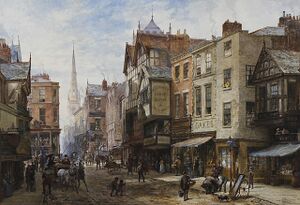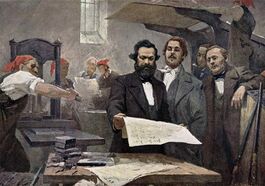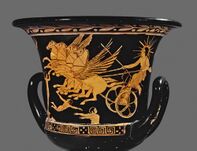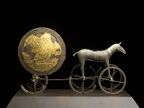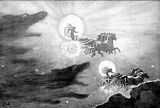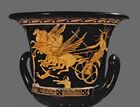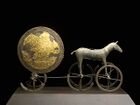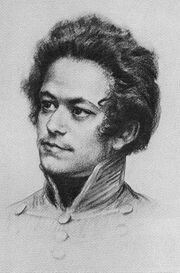User:Harrystein/sandbox
| Welcome to this sandbox page, a space to experiment with the process of editing Leftypedia.
To edit this sandbox, you can either edit the source code ("Edit source" tab above) or use VisualEditor ("Edit" tab above). Then make your changes, and click the "Publish changes" button when finished. You can click "Show preview" to see a preview of what you are about to save, or "Show changes" to see what you have changed. or If you are logged in, you can access your personal sandbox ("Sandbox" link at the very top of the page, next to your username). Please DO NOT place promotional, copyrighted, offensive, or libelous content in sandboxes. For more information on sandboxes, see Help:My sandbox. For information and resources on the basics needed to comprehend, comment on, and edit Leftypedia, see Editing Leftypedia or Guidelines. |
Links to subpages:
In this userspace:
| Harrystein/sandbox |
- Harrystein/sandbox/AWB/CSVLoader
- Harrystein/sandbox/AWB/CSVLoader/four
- Harrystein/sandbox/AWB/CSVLoader/one
- Harrystein/sandbox/Main Page
- Harrystein/sandbox/Main Page/Featured
- Harrystein/sandbox/Main Page/Featured/content
- Harrystein/sandbox/Main Page/Featured/image
- Harrystein/sandbox/Main Page old
- Harrystein/sandbox/Research & Sources
- Harrystein/sandbox/draft
- Harrystein/sandbox/draft/Primitive communism
- Harrystein/sandbox/spamtest
- Harrystein/sandbox/template
- Harrystein/sandbox/template/Linked icons
- Harrystein/sandbox/template/Linked icons/Xicon
- Harrystein/sandbox/template/Linked icons from scratch
- Harrystein/sandbox/template/Linked icons from scratch/link
- Harrystein/sandbox/template/MIA citation
- Harrystein/sandbox/template/MIA citation/1
- Harrystein/sandbox/template/MIA citation/2
- Harrystein/sandbox/template/MIA citation/4
- Harrystein/sandbox/template/MIA citation/5
- Harrystein/sandbox/template/alt-lang
- Harrystein/sandbox/template/essay
- Harrystein/sandbox/template/infobox country
- Harrystein/sandbox/template/infobox person
- Harrystein/sandbox/template/other
- Harrystein/sandbox/text/Draft principles
Imperialism sidebar and other sidebars
| Theories of |
| Imperialism |
|---|
| Theories of |
| Imperialism |
|---|
| Authors |
| V. I. Lenin · Rosa Luxemburg · Samir Amin · John Smith · Michael Hudson |
| Concepts |
| Super‑imperialism · Unequal exchange · Three worlds theory · |
| Issues |
| test |
| Imperialism |
|---|
| Theory |
| Practice |
| Anti-communism |
|---|
| Ideologies |
| Jewish Bolshevism · Liberal anti-communism · |
| History |
| Something here? Idk |
| Atrocities |
|
List of atrocities committed by the United States · List of anti-communist killings · List of White movements
|
| Literature |
| Black Book of Communism · Gulag Archipelago · 1984 · Animal Farm |
| Anti-communism |
|---|
| Political Economy |
|---|
| Authors |
| Concepts |
| Major works |
| Part of a series on |
| Socialism |
|---|
| File:Red flag waving.svg |
Link either to Theories of imperialism (new page) or Imperialism#Theories of imperialism. This could also be combined into a broader "Imperialism" sidebar, which had one section for "Theories/debates" and others for political and other shit. But in my opinion if people disagree on definitions they will probably disagree on what constitutes an imperialist political act. Not everyone can just say "I know it when I see it" - that's imprecise, to me.
See also at Wikipedia: Wikipedia:Template:Imperialism Studies sidebar.
Template:Political economy sidebar here for comparison.
Quote box template
No war is any longer possible for Prussia-Germany except a world war and a world war indeed of an extent and violence hitherto undreamt of. Eight to ten millions of soldiers will massacre one another and in doing so devour the whole of Europe until they have stripped it barer than any swarm of locusts has ever done. The devastations of the Thirty Years’ War compressed into three or four years, and spread over the whole Continent; famine, pestilence, general demoralisation both of the armies and of the mass of the people produced by acute distress; hopeless confusion of our artificial machinery in trade, industry and credit, ending in general bankruptcy; collapse of the old states and their traditional state wisdom to such an extent that crowns will roll by dozens on the pavement and there will be no body to pick them up; absolute impossibility of foreseeing how it will all end and who will come out of the struggle as victor; only one result is absolutely certain: general exhaustion and the establishment of the conditions for the ultimate victory of the working class.
"Israel and South Africa have one thing above all else in common: they are both situated in a predominantly hostile world inhabited by dark peoples."
– Official yearbook of the South African government, 1978[1]
Lorem ipsum. No war is any longer possible for Prussia-Germany except a world war and a world war indeed of an extent and violence hitherto undreamt of. Eight to ten millions of soldiers will massacre one another and in doing so devour the whole of Europe until they have stripped it barer than any swarm of locusts has ever done. The devastations of the Thirty Years’ War compressed into three or four years, and spread over the whole Continent; pestilence and general demoralisation both of the armies and of the mass of the people produced by acute distress; hopeless confusion of our artificial machinery in trade, industry and credit, ending in general bankruptcy; collapse of the old states and their traditional state wisdom to such an extent that crowns will roll by dozens on the pavement and there will be no body to pick them up; absolute impossibility of foreseeing how it will all end and who will come out of the struggle as victor; only one result is absolutely certain: general exhaustion and the establishment of the conditions for the ultimate victory of the working class.
Eight to ten millions of soldiers will massacre one another and in doing so devour the whole of Europe until they have stripped it barer than any swarm of locusts has ever done. The devastations of the Thirty Years’ War compressed into three or four years, and spread over the whole Continent; famine, pestilence, general demoralisation both of the armies and of the mass of the people produced by acute distress; hopeless confusion of our artificial machinery in trade, industry and credit, ending in general bankruptcy; collapse of the old states and their traditional state wisdom to such an extent that crowns will roll by dozens on the pavement and there will be no body to pick them up; absolute impossibility of foreseeing how it will all end and who will come out of the struggle as victor; only one result is absolutely certain: general exhaustion and the establishment of the conditions for the ultimate victory of the working class.
Former Warsaw Pact template
| Part of a series on |
| Former socialist states |
|---|
| List of states |
|
Albania · Bulgaria · Czech Republic · Slovakia · Germany · Hungary · Mongolia · Poland · Romania · Former Soviet Union: (list · of · former SSRs · here) |
| Politics |
| Opinions of socialism · Reactionism (Eurasianism · National Bolshevism · Religion · Decommunization · Banderism) · Western influence (NATO expansion · Color revolutions) |
| Issues |
| Demographic crisis · Economic issues · Poverty · Post-Soviet conflicts |
No war is any longer possible for Prussia-Germany except a world war and a world war indeed of an extent and violence hitherto undreamt of. Eight to ten millions of soldiers will massacre one another and in doing so devour the whole of Europe until they have stripped it barer than any swarm of locusts has ever done. The devastations of the Thirty Years’ War compressed into three or four years, and spread over the whole Continent; famine, pestilence, general demoralisation both of the armies and of the mass of the people produced by acute distress; hopeless confusion of our artificial machinery in trade, industry and credit, ending in general bankruptcy; collapse of the old states and their traditional state wisdom to such an extent that crowns will roll by dozens on the pavement and there will be no body to pick them up; absolute impossibility of foreseeing how it will all end and who will come out of the struggle as victor; only one result is absolutely certain: general exhaustion and the establishment of the conditions for the ultimate victory of the working class.
Lorem ipsum. No war is any longer possible for Prussia-Germany except a world war and a world war indeed of an extent and violence hitherto undreamt of. Eight to ten millions of soldiers will massacre one another and in doing so devour the whole of Europe until they have stripped it barer than any swarm of locusts has ever done. The devastations of the Thirty Years’ War compressed into three or four years, and spread over the whole Continent; pestilence and general demoralisation both of the armies and of the mass of the people produced by acute distress; hopeless confusion of our artificial machinery in trade, industry and credit, ending in general bankruptcy; collapse of the old states and their traditional state wisdom to such an extent that crowns will roll by dozens on the pavement and there will be no body to pick them up; absolute impossibility of foreseeing how it will all end and who will come out of the struggle as victor; only one result is absolutely certain: general exhaustion and the establishment of the conditions for the ultimate victory of the working class.
Eight to ten millions of soldiers will massacre one another and in doing so devour the whole of Europe until they have stripped it barer than any swarm of locusts has ever done. The devastations of the Thirty Years’ War compressed into three or four years, and spread over the whole Continent; famine, pestilence, general demoralisation both of the armies and of the mass of the people produced by acute distress; hopeless confusion of our artificial machinery in trade, industry and credit, ending in general bankruptcy; collapse of the old states and their traditional state wisdom to such an extent that crowns will roll by dozens on the pavement and there will be no body to pick them up; absolute impossibility of foreseeing how it will all end and who will come out of the struggle as victor; only one result is absolutely certain: general exhaustion and the establishment of the conditions for the ultimate victory of the working class.
Template image design testing
No war is any longer possible for Prussia-Germany except a world war and a world war indeed of an extent and violence hitherto undreamt of. Eight to ten millions of soldiers will massacre one another and in doing so devour the whole of Europe until they have stripped it barer than any swarm of locusts has ever done. The devastations of the Thirty Years’ War compressed into three or four years, and spread over the whole Continent; famine, pestilence, general demoralisation both of the armies and of the mass of the people produced by acute distress; hopeless confusion of our artificial machinery in trade, industry and credit, ending in general bankruptcy; collapse of the old states and their traditional state wisdom to such an extent that crowns will roll by dozens on the pavement and there will be no body to pick them up; absolute impossibility of foreseeing how it will all end and who will come out of the struggle as victor; only one result is absolutely certain: general exhaustion and the establishment of the conditions for the ultimate victory of the working class.
Lorem ipsum. No war is any longer possible for Prussia-Germany except a world war and a world war indeed of an extent and violence hitherto undreamt of. Eight to ten millions of soldiers will massacre one another and in doing so devour the whole of Europe until they have stripped it barer than any swarm of locusts has ever done. The devastations of the Thirty Years’ War compressed into three or four years, and spread over the whole Continent; pestilence and general demoralisation both of the armies and of the mass of the people produced by acute distress; hopeless confusion of our artificial machinery in trade, industry and credit, ending in general bankruptcy; collapse of the old states and their traditional state wisdom to such an extent that crowns will roll by dozens on the pavement and there will be no body to pick them up; absolute impossibility of foreseeing how it will all end and who will come out of the struggle as victor; only one result is absolutely certain: general exhaustion and the establishment of the conditions for the ultimate victory of the working class.
Eight to ten millions of soldiers will massacre one another and in doing so devour the whole of Europe until they have stripped it barer than any swarm of locusts has ever done. The devastations of the Thirty Years’ War compressed into three or four years, and spread over the whole Continent; famine, pestilence, general demoralisation both of the armies and of the mass of the people produced by acute distress; hopeless confusion of our artificial machinery in trade, industry and credit, ending in general bankruptcy; collapse of the old states and their traditional state wisdom to such an extent that crowns will roll by dozens on the pavement and there will be no body to pick them up; absolute impossibility of foreseeing how it will all end and who will come out of the struggle as victor; only one result is absolutely certain: general exhaustion and the establishment of the conditions for the ultimate victory of the working class.
No war is any longer possible for Prussia-Germany except a world war and a world war indeed of an extent and violence hitherto undreamt of. Eight to ten millions of soldiers will massacre one another and in doing so devour the whole of Europe until they have stripped it barer than any swarm of locusts has ever done. The devastations of the Thirty Years’ War compressed into three or four years, and spread over the whole Continent; famine, pestilence, general demoralisation both of the armies and of the mass of the people produced by acute distress; hopeless confusion of our artificial machinery in trade, industry and credit, ending in general bankruptcy; collapse of the old states and their traditional state wisdom to such an extent that crowns will roll by dozens on the pavement and there will be no body to pick them up; absolute impossibility of foreseeing how it will all end and who will come out of the struggle as victor; only one result is absolutely certain: general exhaustion and the establishment of the conditions for the ultimate victory of the working class.
Lorem ipsum. No war is any longer possible for Prussia-Germany except a world war and a world war indeed of an extent and violence hitherto undreamt of. Eight to ten millions of soldiers will massacre one another and in doing so devour the whole of Europe until they have stripped it barer than any swarm of locusts has ever done. The devastations of the Thirty Years’ War compressed into three or four years, and spread over the whole Continent; pestilence and general demoralisation both of the armies and of the mass of the people produced by acute distress; hopeless confusion of our artificial machinery in trade, industry and credit, ending in general bankruptcy; collapse of the old states and their traditional state wisdom to such an extent that crowns will roll by dozens on the pavement and there will be no body to pick them up; absolute impossibility of foreseeing how it will all end and who will come out of the struggle as victor; only one result is absolutely certain: general exhaustion and the establishment of the conditions for the ultimate victory of the working class.
Eight to ten millions of soldiers will massacre one another and in doing so devour the whole of Europe until they have stripped it barer than any swarm of locusts has ever done. The devastations of the Thirty Years’ War compressed into three or four years, and spread over the whole Continent; famine, pestilence, general demoralisation both of the armies and of the mass of the people produced by acute distress; hopeless confusion of our artificial machinery in trade, industry and credit, ending in general bankruptcy; collapse of the old states and their traditional state wisdom to such an extent that crowns will roll by dozens on the pavement and there will be no body to pick them up; absolute impossibility of foreseeing how it will all end and who will come out of the struggle as victor; only one result is absolutely certain: general exhaustion and the establishment of the conditions for the ultimate victory of the working class.
No war is any longer possible for Prussia-Germany except a world war and a world war indeed of an extent and violence hitherto undreamt of. Eight to ten millions of soldiers will massacre one another and in doing so devour the whole of Europe until they have stripped it barer than any swarm of locusts has ever done. The devastations of the Thirty Years’ War compressed into three or four years, and spread over the whole Continent; famine, pestilence, general demoralisation both of the armies and of the mass of the people produced by acute distress; hopeless confusion of our artificial machinery in trade, industry and credit, ending in general bankruptcy; collapse of the old states and their traditional state wisdom to such an extent that crowns will roll by dozens on the pavement and there will be no body to pick them up; absolute impossibility of foreseeing how it will all end and who will come out of the struggle as victor; only one result is absolutely certain: general exhaustion and the establishment of the conditions for the ultimate victory of the working class.
Lorem ipsum. No war is any longer possible for Prussia-Germany except a world war and a world war indeed of an extent and violence hitherto undreamt of. Eight to ten millions of soldiers will massacre one another and in doing so devour the whole of Europe until they have stripped it barer than any swarm of locusts has ever done. The devastations of the Thirty Years’ War compressed into three or four years, and spread over the whole Continent; pestilence and general demoralisation both of the armies and of the mass of the people produced by acute distress; hopeless confusion of our artificial machinery in trade, industry and credit, ending in general bankruptcy; collapse of the old states and their traditional state wisdom to such an extent that crowns will roll by dozens on the pavement and there will be no body to pick them up; absolute impossibility of foreseeing how it will all end and who will come out of the struggle as victor; only one result is absolutely certain: general exhaustion and the establishment of the conditions for the ultimate victory of the working class.
Eight to ten millions of soldiers will massacre one another and in doing so devour the whole of Europe until they have stripped it barer than any swarm of locusts has ever done. The devastations of the Thirty Years’ War compressed into three or four years, and spread over the whole Continent; famine, pestilence, general demoralisation both of the armies and of the mass of the people produced by acute distress; hopeless confusion of our artificial machinery in trade, industry and credit, ending in general bankruptcy; collapse of the old states and their traditional state wisdom to such an extent that crowns will roll by dozens on the pavement and there will be no body to pick them up; absolute impossibility of foreseeing how it will all end and who will come out of the struggle as victor; only one result is absolutely certain: general exhaustion and the establishment of the conditions for the ultimate victory of the working class.
Gallery/images
The Proto-Indo-European culture is a hypothetical prehistoric society which is thought to have spoken the Proto-Indo-European language (PIE), the theoretical common ancestor of hundreds of languages native to Eurasia known collectively as the Indo-European (IE) language family.
In the 18th century, European scholars studying the Hindu classics noted a striking affinity in vocabulary and grammar between Sanskrit, Latin, and Ancient Greek, suggesting a common origin. By the 1830s, research into these languages had discovered reliable sound correspondences which allowed for the inclusion of more dissimilar families like the Celtic, Germanic, and Persian languages. Scholars would later add the Albanian, Armenian, and Balto-Slavic branches as well as several extinct languages. At present, the Indo-European hypothesis is one of the best-supported linguistic theories in the field and is considered to constitute the foundation of historical and comparative linguistics.
In addition to linguistic similarities, cultural and linguistic data in several Indo-European languages show correspondences in religion, mythology, hierarchy, technology, and material culture, allowing for the tentative reconstruction of the cultural complex which may have accompanied such a language. The close relationship between language and culture, however, tends to transcend genetic lineage as different groups assimilate with their neighbors or rulers, and a postulated common origin should not be confused with a racial or genealogical affinity. The harmonization of the relevant linguistic, archaeological, and genetic evidence is a continuing problem in Indo-European studies.
Since its discovery in the late 18th century, the Indo-European language hypothesis has inspired conclusions about its significance. The anthropologist Marija Gimbutas claimed that the spread of the Indo-Europeans represented a conflict between a warlike, masculine culture and non-IE matriarchical, peaceable societies. Colin Renfrew, a British archaeologist, connected the expansion of the Indo-European languages with the spread of the Neolithic Revolution from Anatolia and into Europe. Both theories are largely discarded by linguists today. However, the most well-known application of the theory is Aryanism, pioneered by racial theorist Arthur de Gobineau, according to which the Proto-Indo-Europeans constituted a superior race which expanded due to genetic superiority. This theory was most famously adopted by the National Socialist movement and served as the superstructure of the revived German war machine.
caption1 | caption2 |
caption3 | caption4 |
Infobox person
User:Harrystein/sandbox/infobox person
Early life
Karl Heinreich Marx was born in Trier, Rhenish Prussia (present-day Germany), on May 5, 1818, the son of Heinrich Marx, a lawyer, and Henriette Presburg Marx, a semi-illiterate Dutchwoman, as one of 8 children (Henriette Marx, Eduard Marx, Mauritz David Marx, Hermann Marx, Emilie Conradi, Caroline Marx, and Louise Juta). Little else is known about his childhood other than the fact that he became the oldest son when his brother Mauritz died in 1819.
Both Heinrich and Henriette were descendants of a long line of rabbis. The Prussian authorities barred him from the practice of law because he was Jewish following an anti-Semitic law passed in 1815. Heinrich Marx converted to Lutheranism in about 1817. Yet he was largely irreligious, specifically choosing Lutheranism over Catholicism because he equated Protestantism with intellectual freedom,[2] and was also a passionate liberal activist, being an admirer of the works of Immanuel Kant and Voltaire. However, he was still fiercely patriotic and monarchistic, and educated his family as liberal Lutherans rather than atheists. Karl was baptized in the same church in 1824 at the age of six.
Education
Karl attended the Friedrich Wilhelm Gymnasium in Trier for five years, graduating in 1835 at the age of seventeen.[3] The gymnasium's program was the customary classical one—history, mathematics, literature, and languages, especially Greek and Latin. His father had chosen the school in particular because the school's principal was a friend of his, as well as a liberal, Kantian, and held in respect by the Rhenish people. Karl became very skilled in French and Latin, both of which he learned to read and write fluently. In later years he taught himself other languages, so that as a mature scholar he could also read Spanish, Italian, Dutch, Scandinavian, Russian, and English. As his articles in the New York Daily Tribune show, he came to wield the English phraseology masterfully (he loved Shakespeare, whose works he knew by heart), although he never lost his strong German accent when speaking. The Prussian authorities grew suspicious of the school, in 1832, the school was raided. However, the school remained in operation, and Marx was able to graduate in 1835.
In October 1835, seventeen-year-old Marx enrolled in Bonn University in Bonn, Germany, where he attended courses primarily in law, as it was his father's desire that he become a lawyer. Marx, however, was more interested in philosophy and literature than in law.[4] He wanted to be a poet and dramatist. In his student days he wrote a great deal of poetry—most of it preserved—such as "The Fiddler," "Nocturnal Love," and "Transformation,"[5] many written to express his affection for Jenny von Westphalen, his childhood sweetheart whom he became engaged to in 1836. Her father, Baron Johann Ludwig von Westphalen, had introduced Marx to philosophy and the politics of Saint-Simon, a French utopian socialist. He spent a year at Bonn, studying little but partying and drinking a lot. He also piled up heavy debts. Marx's dismayed father took him out of Bonn and had him enter the University of Berlin, then a center of intellectual debate, where he studied Hegel. While Marx admired Hegel and Feuerbach's philosophy due to their belief in historical inevitability, he questioned what he saw as their philosophy's abstract and Idealist thought, as he believed that reality lies more in material economic conditions. In Berlin a coterie of brilliant thinkers was challenging existing institutions and ideas, including faith, philosophy, ethics, and politics. He spent more than four years in Berlin, completing his studies with a doctoral degree in March 1841, having written a thesis entitled The Difference Between the Democritean and Epicurean Philosophy of Nature,[6] in which he compared the atomist philosophy of Democritus and Epicurus regarding contingency (statement that is neither necessarily undeniably true or undeniably false). However, he had to submit this dissertation to the University of Jena, as it would not be well received in Berlin, where he had a reputation as a Young Hegelian Radical.
Early intellectual development
Liberal agitation
At the age of 24, Marx decided to turn to journalism to make a living, and in 1842 he became the editor of the radical-democratic newspaper in Cologne, the Rheinische Zeitung or Rhenish Gazette, which was financed by wealthy liberals from the Rhineland. It ran for less than a year, only from October 1842 to the Spring of 1843, at which point it was censored by the government, yet in it he published a very important article On Freedom of the Press. In it, he not only criticizes the Prussian government's censorship, but also the role of the press in society, as well as the relation between journalists and those who finance the press. He concludes that not only is the Prussian rationale behind censorship illogical, supposing that "to fight freedom of the press, one must maintain the thesis of the permanent immaturity of the human race... If the immaturity of the human race is the mystical ground for opposing freedom of the press, then certainly censorship is a most reasonable means of hindering the human race from coming of age," but also even the traditional liberal demand for a free press must go beyond simply defending newspapers from censorship by the state, but also beyond the control of newspapers and the means of communication for private interest.[7]
Socialist agitation
In Cologne he also met Moses Hess, a radical who organized socialist meetings, and whom Marx would associate with in the future. Hess, however, was one of the German "true" socialists," a group whose philosophy Marx would later criticize for their failure to adequately explain the social conditions of communism, and for merely dealing with their righteousness.[8] Yet Hess would play a critical part in Marx's intellectual development, with him himself becoming a Marxist in 1847, as it was at his socialist meetings that Marx would first learn the struggles of the German working class. Marx would first learn of the struggle of the Mosel wine farmers, who at first benefited from Prussian rule after Prussia gained the territories it had occupied in the Napoleonic Wars west of the Rhine river following the Vienna Peace Congress in 1815, since they could export their wine to Prussia tax free. However this ended with the establishment of the German Customs Union, or Zollverein, giving Prussian wine merchants an advantage over their competitors west of the Rhine. A bad harvest coupled with Prussia's unfavorable tax policy led to the many wine farmers in Mosel being reduced to poverty. Accounts of their suffering appalled Marx, who condemned the Prussian government in a newspaper article published in 1843 in the Rhenish Gazette.[9] Following this, the Gazette was banned, and Prussian authorities threatened to arrest Marx. Marx quickly married Jenny Von Westphalen, despite the objections of both families, and fled to Paris.
References
- ↑ Department of Information 1978, p. 59.
- ↑ http://www.biography.com/people/karl-marx-9401219#synopsis
- ↑ http://biography.yourdictionary.com/karl-marx
- ↑ http://www.notablebiographies.com/Ma-Mo/Marx-Karl.html
- ↑ http://homepages.which.net/~panic.brixtonpoetry/marxpoetry.pdf
- ↑ https://www.marxists.org/archive/marx/works/1841/dr-theses/
- ↑ http://socialistreview.org.uk/376/marx-freedom-press
- ↑ https://www.marxists.org/history/etol/writers/hook/1934/12/hess-marx.htm
- ↑ http://themanfrommoselriver.com/2007/09/26/karl-marx-and-mosel-wine/
